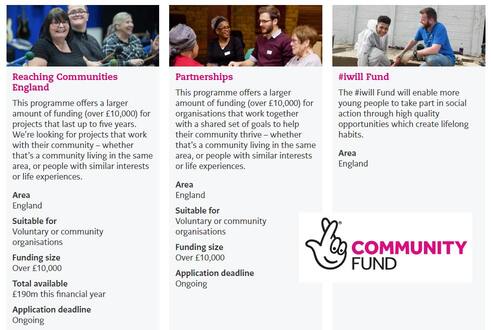|
With rising levels of social need and ever-increasing competition for grants, the National Lottery Community Fund remains one of the few bright spots of hope in the UK funding landscape for many charities. While the £600million+ they give away each year through various programmes is a lifeline for many organisations, some are put off applying because of the time required to understand the different programmes and funding criteria, concern about the level of competition, or not being sure that they’re eligible. We’ve helped charities to secure over £1million of Lottery funding in recent years, and have developed a good understanding of what Lottery are looking for, and how to emphasise key strengths and address weaknesses in your application. And since many community-based organisations need stable multi-year funding more than ever before, we wanted to share a few tips: Think laterally about the definition of a ‘community’A common misconception is that when Lottery say they provide funding to ‘communities’, they only mean physical, geographical communities. This isn’t the case, because Lottery can and do fund organisations supporting communities of interest, which they define as ‘people with similar interests or life experiences’. We recently worked with The PKD Charity to secure Reaching Communities funding for their programme of face-to-face, online and telephone support for patients and families affected by polycystic kidney disease. The people they support live all around the UK, and some rarely if ever physically meet up with others. However, feedback from beneficiaries and charity staff emphasised that people forge important relationships through the charity’s social media support groups, telephone befriending or periodic meet-ups – and that these relationships help them to overcome challenges and live more fulfilled lives. That’s the true definition of a community – and it was a community that relied to stable funding to flourish. If your organisation works with people united by certain interests or challenges, rather than a geographical location, then you may well be eligible for Lottery funding if you can make a similar case for support. Demonstrate that your community values your service and has been involved in designing itThis is arguably the most important criteria for many Lottery funding programmes. You need to show that your services are genuinely based on people’s ideas, aspirations and unmet needs, not just dreamed up in a boardroom somewhere. This can be difficult to demonstrate, particularly if it feels like second nature. For example, if you run a local community centre, your frontline staff will interact with service users on a daily basis, and naturally develop activities in response to their ideas and needs. As we’ve written before, you still need explain and provide examples of how this happens, as well as detailing more formal consultation methods, such as surveys and focus groups. Working with The PKD Charity, we had an unfair advantage – they’d actually commissioned us previously to run a stakeholder consultation exercise, which involved surveying hundreds of patients on their needs and opinions about the charity’s support, and interviewing prominent medical professionals. This type of exercise takes time and money, but is hugely beneficial for Lottery applications – and indeed for other funders. So don't hold back from including your consultation data in your application. Bring your application to life with a range of mediaA strong funding application doesn’t just rely on written words. Images and video bring your work to life, inspire empathy, and allow people to tell their story in their own words. This again helps to demonstrate community support and involvement in your project. Audio clips are an underused tool for people who have a story to tell but don’t feel comfortable talking in front of a camera. And diagrams and infographics can often explain something succinctly that'd otherwise need a few hundred words. Lottery encourage and appreciate the use of imagery, audio and video. For some funding programmes, you can actually by video rather than in writing. And you can really bring a detailed second-stage funding proposal to life by including things like infographics, embedded audio clips and video links. Explain what other services exist for your community, and their limitationsLike many funders, Lottery are anxious to avoid duplication – in other words, funding multiple organisations to deliver overlapping services. This doesn’t mean that your work needs to be 100% unique – and claiming that it is may show that you haven’t researched your project well enough. However, you should explain why other services aren’t accessible to the people you support, or appropriate for their needs. For example, when we secured funding for a youth employability charity, we provided evidence that young people were put off accessing other local services because they didn’t have an opportunity to build a trusting relationship with the service providers, and because of the complexities of local gang rivalry and ‘territory’. In another successful application, we showed how people with a learning disability weren't benefitting from mainstream health and wellbeing activities, because they needed extra time and support to address their complex needs. This is a way to both demonstrate an in-depth understanding of your sector, and provide further evidence that your services are based around people’s needs and views. Always seek and clarify feedback from your Funding OfficerWhile Lottery ask for a lot of detail for their larger funding programmes, they’ll also provide feedback along the way – particularly if you ask the right questions. If you apply to Reaching Communities, you might receive initial written feedback on areas to strengthen and clarify, an opportunity to discuss your idea by phone with a Funding Officer, detailed guidance on what to then include in a full proposal, and even an opportunity to get a draft reviewed before submitting. Receiving feedback and even criticism about your work can feel uncomfortable, but embracing this scrutiny will improve your chances of securing funding. Take every opportunity to clarify feedback that you don’t understand, and pro-actively check that you’ve explained any complexities in your project clearly.
For example, for a recent application that we supported, the Funding Officer expressed concern about the financial sustainability of the project. This was something we felt had already been addressed adequately – but by drawing their attention to what we’d written already and asking what they felt was unclear or missing, we were able to drill down into exactly what the assessment panel was looking for, and how best to provide it. We’re confident that following these tips will increase your chances of securing Lottery funding, and indeed other grants too. Feel free to suggest any further tips in the comments below. Good luck with your application, and take a look at how we could potentially help you with funding applications.
Masha van wyk
12/3/2020 06:03:58 pm
Riverlea extension against child hunger Npo 173_985 has been struggling to secure funding as we regarded as an undeveloped area 28/8/2021 01:39:45 pm
We are thinking of employing someone to take forward our application for £30000 to the Heritage Lottery Fund for the internal refurbishment of the dis used signal box at Chorleywood station, is this something you do and what would be the cost 1/9/2021 02:28:37 pm
Hi Martin - thanks for getting in touch about this. This is potentially something that one of our consultants could help you with, depending on the details. Please could you send an email to [email protected], so we can respond with a bit of info about our fees and arrange a chat with you to find out more? Thanks, Mike 3/5/2022 11:33:24 am
Had a funded Strength Review, met with Lottery and now working up 3/5 year bid. Constantly they ram strategy at us. Our strategy is that we are now a mid sized charity who need funding for core costs (people in important roles) 17/5/2022 08:45:30 am
Hi Andy, apologies for the slow reply, and sorry to hear that your Organisational Strengths Review hasn't been too helpful. There are no easy ways to secure unrestricted grant funding, as there still aren't enough funders offering it. That said, this is gradually changing - many funders switched to offering unrestricted grants with fewer reporting requirements during the pandemic as a necessity, and have been reflecting positively on how impactful this was both for them and the organisations they funded. Comments are closed.
|
Like this blog? If so then please...
Categories
All
Archive
May 2024
|
Lime Green Consulting is the trading name of Lime Green Consulting & Training Ltd (registered company number 12056332)




 RSS Feed
RSS Feed